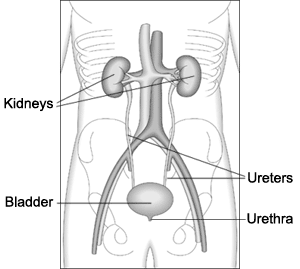|

What
is diabetes ? | What does insulin do ?
| What are
kidneys ? | What do the kidneys do ?
How does diabetes affect the kidneys ? | Are there different
types of diabetes ?
What are your chances of developing kidney disease ? | What
can you do to prevent kidney damage ?
What happens if kidneys fail ?

Diabetes is a disease which is caused by the lack of
insulin in the body or the body's inability to properly use normal amounts
of insulin.

The body converts the food we eat into sugar (glucose). The
body needs this sugar, in the form of energy, to perform its functions.
The hormone insulin, produced by the pancreas, regulates the amount of
glucose (sugar) in the blood. If the body lacks insulin or does not use
the insulin properly, then this imbalance results in high blood sugar.
Eventually many unhealthy changes can occur in different body organs,
including the kidneys.

The kidneys
are the master chemists of the body. Normally,
there are two of them, one on either side of the spine under the lower
ribs. They are reddish brown in colour and shaped like kidney beans. Each
kidney is about the size of your clenched fist.
LOCATION
OF KIDNEYS


Healthy kidneys do three essential things. They remove
wastes from the blood via the urine and return the cleaned blood back to
the body. They regulate the levels of water and different minerals needed
by the body for good health. They produce hormones that control other body
functions. Many other organs depend on the kidneys in order to work
properly.

Damage to blood vessels
Even with the use of injected insulin, people who have had diabetes for
some time often suffer from damage to the small blood vessels of the body.
This may cause damage to the retina of the eye and result in loss of
vision. Also, the delicate blood vessels in the filters of the kidney may
be damaged. At the early stage, this damage is shown by finding protein in
the urine.
Sometimes at a later stage, so much protein is lost from the blood that
water from the blood moves into the body tissues and causes swelling
(edema). After a number of years, the kidneys' filters can become so
damaged by diabetes that the kidneys fail. Because smoking also damages
the blood vessels, it worsens the complications of diabetes. People with
diabetes should try to stop smoking completely.
Damage to nerves
Diabetes can also damage the nerves in many parts of the body. When the
bladder is affected, it may be difficult to pass urine. If urine builds up
in the bladder, the pressure can cause it to back up to the kidneys
causing damage there.
Infections
The urine of people with diabetes has a high sugar content. This
encourages the growth of bacteria and kidney infections may occur. People
with diabetes must take special care to avoid infections and have them
treated immediately.

There are several types of diabetes. The most common ones
are Type 1 and Type 2.
Type 1 - Juvenile Onset Diabetes
·
Occurs mainly in young people
·
Is caused by an inability of the pancreas to produce enough insulin
·
Requires regular insulin injections
Type 2 - Adult Onset Diabetes
·
Usually develops in people over the age of forty
·
The pancreas produces close to normal amounts of insulin, but the
body is unable to use it properly
·
Making proper food choices and/or taking oral medication can
control the abnormal blood sugar level

About 40% of people with Type 1 diabetes (juvenile onset)
and 10% of people with Type 2 diabetes (adult onset) will eventually
develop kidney disease which will lead to permanent chronic renal
insufficiency (kidney failure).

You could have serious kidney damage without being aware of
it. There are usually no specific symptoms of diabetic kidney disease
until the kidneys fail completely. However, there are certain early signs
or risk factors for you and your doctor to watch for:
·
High blood pressure
(over 130/85 mm Hg*) or a family history of
high blood pressure
·
Protein in the urine
·
Burning or difficulty during urination
*The medical guidelines for what is considered "high blood
pressure" change from time to time. Please consult your doctor.

Certain tests can help to detect kidney damage at an early
stage. There are also special treatments (including proper food choices
and medications) which may help to delay kidney failure. It is necessary
to start these treatments as soon as your doctor notices any of the early
signs or risk factors. Therefore, you should stay in close touch with your
doctor.
There are many things you can do to help prevent kidney damage:
·
Maintain good control of your diabetes
·
Control high blood pressure
·
Stop smoking
·
Have infections treated immediately
·
Avoid alcohol
·
Get enough sleep
·
Make the proper food choices
·
Exercise regularly
·
Have your urine, blood and blood pressure checked regularly by your
doctor
·
Ask your doctor about any new developments in the treatment of
diabetes

When your kidneys are about to fail you might experience
tiredness, nausea and vomiting. You may also find that you need less
insulin than usual. When the kidneys fail, wastes and fluids will
accumulate in your body and you will need dialysis treatments or a
kidney
transplant.
Mail us for more information

|












